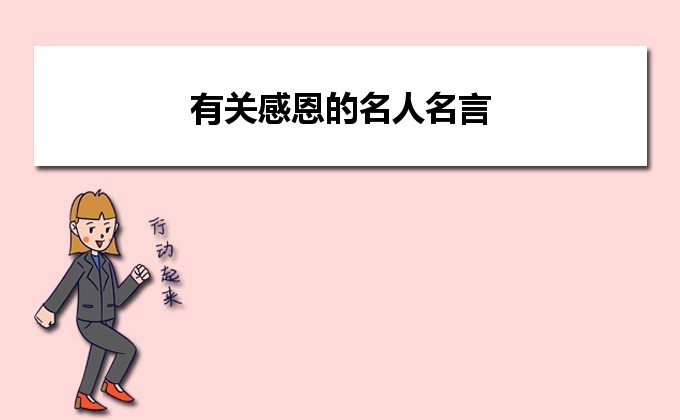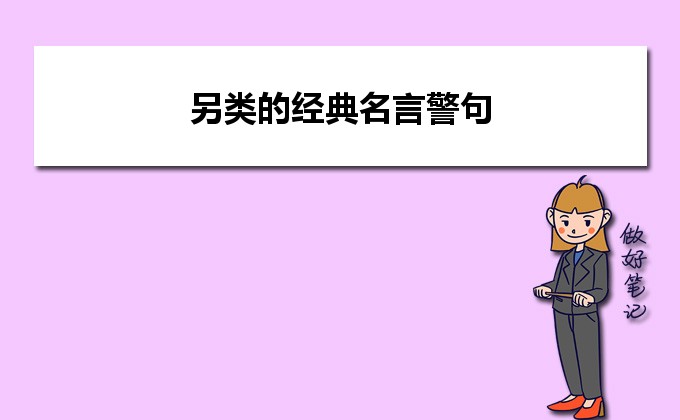There are painters who transform the sun to a yellow spot, but there are others who with the help of their art and their intelligence, transform a yellow spot into the sun. (Picasso, Spanish painter)
有些畫家把太陽畫成一個黃斑,但有些畫家借助于他們的技巧和智慧把黃斑畫成太陽。(西班牙畫家 畢加索)
When a dog bites a man that is not news, but when a man bites a dog that is news. (Charls A.Dana, American journalist)
狗咬人不是新聞,人咬狗才是新聞。(美國記者 達納 C A)
When one loves one's art no service seems too hard. (O.Henry, American novelist)
一旦 熱愛藝術(shù),什么奉獻也不難。(美國小說家 歐·享利)
Words have a magical power. They can bring either the greatest happiness or deepest despair; can transfer knowledge from teacher to students words enable the orator to sway his audience and dictate its decisions. Words are capable of arousing the strongest emotions and prompting all man's actions. Do not ridicule the use of words in psychotherapy. (Sigmund Freud, German Psychiatrist)
言辭具有不可思議的力量。他們能帶來最大的幸福,也能帶來最深的失望;能把知識從教師傳給學生;言辭能使演說者左右他的聽眾,,并強行代替他們作出決定。言辭能激起最大強烈的情感,促進人的一切行動。不要嘲笑言辭在心理治療當中的的用途。 (德國精神分析學家 弗洛伊德 S)
A great poem is a fountain forever overflowing with the waters of wisdom and delight (P.B.Shelley, British poet)
偉大的詩篇即是永遠噴出智慧和歡欣之水的噴泉。(英國詩人 雪萊 P B)
A novel is a mirror walking along a main road. (Stendhcl,French writer)
一部小說猶如一面在大街上走的鏡子。(法國作家 司湯達)
A picture is a poem without words. (Horace, ancient Roman poet)
一幅畫是一首沒有文字的詩歌。(古羅馬詩人 賀拉斯)
A poet is a man who puts up a ladder to a star and climbs it while playing a violin. (E.de Goncourt, French writer)
詩人是這樣的人,他架起通向星星的梯子——一邊爬梯子一邊拉提琴。(法國作家 龔古爾 E)
A poet is born, not made. (L.A.Florus, Ancient Roman poet)
詩人靠天分,不是靠培養(yǎng)。(古羅馬詩人 弗洛魯 L A)
Any one who conducts an argument by appealing to authourity is not using his intelligence; he is just using his memory. (Da Vinci, Italian painter)
一個借著引經(jīng)據(jù)典來辯論的人,不是在運用自己的才智,他是在運用自己的記憶力。(意大利畫家 達·芬奇)
Art is a lie that tells the truth. (Picasso, Spanish painter)
美術(shù)是揭示真理的謊言。(西班牙畫家 畢加索)
Art is long, and time is fleeting. (Longfellow, American poet)
藝術(shù)是永恒的,時間則是瞬息即逝的。(美國詩人 朗費羅)
Art is much less important than life, but what a poor life without it ! (Robert Motherwell, American painter)
藝術(shù)遠沒有生活重要,但是沒有藝術(shù)生活是多么乏味呀!(美國畫家 馬赦韋爾 R)
Art is not a handicraft, it is the transmission of feeling theorist has experienced. (Len Tolstoy, Russian writer)
藝術(shù)不是手藝,它是藝術(shù)家的體驗到的感情的傳遞。(俄國作家托爾斯泰。L)
Art is the mold of feeling as language is the mold of thought. (Susanne Langer, American philosopher)
藝術(shù)是感情的模制品,猶如語言是思想的模制品。(美國哲學家 蘭格 S)
Art is the object of feeling, and the subject of nature. (S.K.langer, American philosopher and educator)
藝術(shù)是情感的客觀表現(xiàn)。也是本性的主觀反映。(美國哲學家、教育家 蘭格 S K)
Art is the right hand of nature. The latter only gave us being, but the former made us men. (Friedrich Schiller, German poet)
藝術(shù)是自然的右手。自然只讓我們存在,而藝術(shù)創(chuàng)造我們的人類。(德國詩人 席勒 F)
Art is the stored honey of the human soul, gathered on wings of misery and travel. (Theocore Dreser, American novelist)
好畫猶如佳肴,只可意會,不可言傳。(法國畫家 弗拉曼克 M)
Good painting is like good cooking; it ca n be tasted, but not explained. (Maurice de vlaminck, French painter)
簡單地說,偉大的文學就是包涵極其豐富意義的語言。(美國詩人 龐德 E)
Great literature is simply language charged with meaning to the utmost possible degree (Ezra Poud, American poet)
幽默被人正確地解釋為“以誠摯表達感受,寓深思于嬉笑”。(美國詩人 龐德 E)
Humor has been well defined as thinking in fun while feeling in earnest. (Mark Twain, American novelist)
我寫作只是為了增加自身的美。(美國作家 杰克·倫敦)
I write for no other purpose than to add to the beauty that now belongs to me. (Jack London, American writer)
音樂要用心靈去聽,用頭腦去感覺。(法國作家 雨果 V)
In music one must think with the heart and feel with the brains. Victor Hugo, French writer Jazz tickles your muscles, symphonies stretch your soul. (PaulWhiteman, American conductor)
爵士樂使你的肌肉發(fā)癢,交響樂能舒展你的靈魂。(美國指揮家 懷特曼 P)
iterature is a kind of intellectual light which, like the light of the sun, may sometimes enable us to see what we do not like. (Samuse Johnson, British writer and critic)
文學是一種理智之光,它和陽光一樣,有時能使我們看到我們不喜歡的東西。(英國作家、批評家 約翰遜 S)
Love and scandale the best sweeteners of tea. (HenryFielding, British writer)
風流韻事與丑聞是品茶聊天時的最佳話題。(英國作家 菲爾丁 H)
Music has charms to soothe a savage breast, to soften rocks or bend a knotted oak. (William Congreve. British dramatist)
音樂有著撫慰粗野的胸懷、軟化頑石或使千年老樹彎腰的魅力。(英國劇作家 康格里夫 W)
Music is the only language in which you cannot say a mean or sarcastic thing. (John Erskine, American educator)
音樂是唯一不能用及表達卑鄙的或諷刺的事物的語言。(美國教育家 厄斯金 J)
Painting is silent poetry, and poetry is a apeaking picture. (Simonides, ancient Greek writer)
畫是無言之詩,詩是有聲之畫。(古希臘作家 西蒙尼特斯)
Rules and modesty destroy genius and art. (William Hazlitt, British essayist)
規(guī)則與謙遜會毀掉天才和藝術(shù)。(英國散文家 哈茲里特 W)
Satire is a sort of glass, wherein beholders do generally discover everybody's face their own. (Jonathan Swift, British writer)
諷刺是一面鏡子,觀看者通常從中看到每一個人的面容卻看不到自己。(英國作家 斯威夫特 J)
Some people Ptend to despise the things they cannot have. (Aesop, ancient Greek fable writer)
吃不到葡萄的人說葡萄酸。(古希臘寓言作家 伊索)
Speech is a mirror of the soul; as a man speaks, so is he. (Ephraem Syrus, American writer)
語言是心靈的鏡子;一個人只要說話,他說的話就是他的心靈的鏡子。(美國作家 塞拉斯 E)
Sunshine can burn you, food can poison you, words can condemn you, pictures can insult you; music cannot punish ---- only bless. (Arthur Schnabel, Austrian pianist)
陽光可能炙烤你,食品可能毒害你,言語可能詛咒你,圖畫可能侮辱你——音樂不會處罰你只會祝福你。(奧地利鋼琴家 施納貝爾 A)
The art of giving Psents is to give something which others cannot buy for themselves. (Alan Alexander Milne, British humorist)
送禮的藝術(shù)在于送別人不能給自己買的東西。(英國幽默作家 米爾恩 A A)
The decline of literature indicates the decline of a nation; the two keep in their downwad tendency. (Johann Wolfgang von Goethe German poet)
文學的衰落表明一個民族的衰落。這兩者走下坡路的時候是齊頭并進的。(德國詩人 歌德 J W)
The lanscope belongs to the man who looks at it. (Ralph Waldo Emerson, American thinker)
風景屬于看風景的人。(美國思想家 愛默生 R W)
The love of beauty is an essential part of all healthy human nature.(John Ruskin, American writer and critic)
愛美是健康人性的重要組成部分。(美國作家、批評家 羅斯金 J)
The poet's voice need not merely be the record of man, it can be one of the props , the pillars to help him endure and Pvail. (William Fulkner, American writer)
詩人的聲音不應只是人類的記錄,而應是使人類永存并得到勝利的支柱和棟梁。(美國作家福克納.W.)
The value of culture is its effect on character. It avails nothing unless it ennobles and strengthens that. Its use is for life. Its aim is not beauty but goodness. (Somerset Maugham, British noverlist and dramatist)
文化的價值在于它對人類品性的影響。除非文化能使品性變?yōu)楦呱小⒂辛ΑN幕淖饔迷谟隈砸嫒松哪繕瞬皇敲溃巧啤?英國小說家和戲劇家 毛姆 S)









